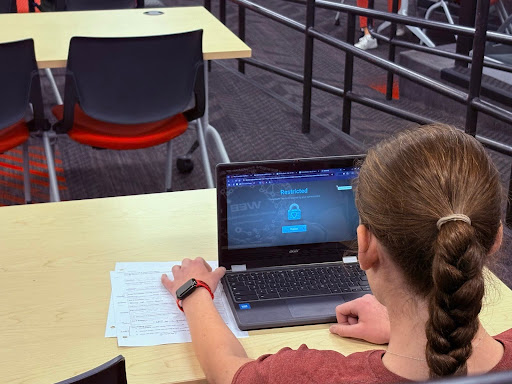ChatGPT to forever change writing at Homestead
Websites such as ChatGPT can create an entire essay based off of a short prompt.
With exams drawing ever closer, some Homestead students are hard at work – and others are not, instead choosing to use ChatGPT to generate their essays for them. All students have to do is enter a short prompt, and their entire essay is written in a matter of seconds.
ChatGPT (GPT stands for Generative Pre-trained Transformer) was released in November 2022 and has enjoyed a dramatic rise in popularity in the last few months.
“It seems like ChatGPT is everywhere now,” an anonymous sophomore said. “I’ve used it for studying because you can ask it to give you practice questions. I know some people use it for graded assignments, especially for English and language classes.”
Some Homestead students have chosen to use ChatGPT to write essays for AP classes and submit the generated work as their own, which teachers quickly caught onto. However, with no rules set prior to the writing process, it was impossible to monitor which students actually wrote their essays and which simply copy-pasted from ChatGPT.
“The students who admitted to cheating came up with their own topic ideas for research but used AI to better understand what their argument was. They then put those ideas in their paper. They didn’t do their research.” Eric Bauer, English teacher, explained. “It’s disappointing that kids aren’t interested enough in the topics they chose to do their own thinking.”
This cheating incident has been the catalyst for change in the essay writing process of future Homestead classes. “Students will have to demonstrate that they have engaged in writing by showing outlines or semantic maps, and be aware of what their version history looks like so that there are no incidences of pasted text that are unaccounted for,” Bauer said. “There will also be monitored process writing during class for long-term assignments. It’s unfortunate for the kids that haven’t broken rules and like to do things on their own. But you have to apply the same standards to everyone.”
School districts across the country are taking action to prevent cheating with ChatGPT. According to The Guardian, The New York City School District has completely banned ChatGPT across all devices and networks for fear of “negative impacts on student learning, and concerns regarding the safety and accuracy of contents.” The Los Angeles School District temporarily banned ChatGPT in December.
Other districts hope to one day take advantage of the positive uses of AI and teach about it in an ethical manner. According to USA Today, in Oakland, the district wants to use AI tech in schools, but not until teachers are “trained on [its] ethical use in order to avoid an overall negative impact upon student learning.”
However, past the high school level, the future of rules regarding ChatGPT is uncertain. Colleges have hesitated to enforce bans on AI-generating websites. At Princeton, for example, professors are being advised to set their own rules about AI. According to a survey from the online magazine Intelligent, out of 1,000 college students, “30% have used ChatGPT on written homework” and “close to 60% use it on more than half of their assignments.”
One shocking element of ChatGPT is its environmental toll, which many are unaware of. Besides releasing carbon emissions, the software also wastes copious amounts of water. according to a study by the University of California, Riverside, Microsoft used 700,000 L of freshwater during the training process for GPT-3 to keep machinery temperatures under control. The study also found that for every 20-50 questions asked, the software consumes about 500 mL of water – about the size of a standard plastic water bottle.
“I first heard about the environmental impact of ChatGPT on Tiktok, and had to Google it to see if it was true – and it was. I was shocked,” an anonymous sophomore said. “It’s like, why was this even invented?”
Though consequences for Homestead students who used AI-generated material in their essays this year were not severe, administrators promise to be on the lookout for possible plagiarized writing in the future. A new feature of the popular submission site TurnItIn.com scans for ChatGPT in essays, allowing teachers to see possible instances of AI plagiarism. According to Bauer, Homestead will be forming a committee of teachers across disciplines to create a new policy regarding AI.
“While creating a paper that is not going to meet the standards for the College Board because of the use of AI, you are at the same time destroying any respect or trust I have for you as a student. So you are accomplishing less than nothing,” Bauer said of his students who used AI to cheat. “You shouldn’t be willing to give up your right to have a thought or opinion to a computer.”






